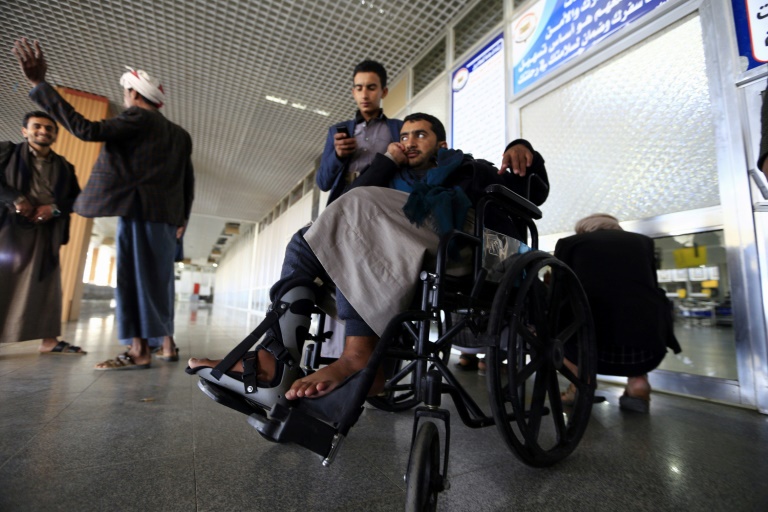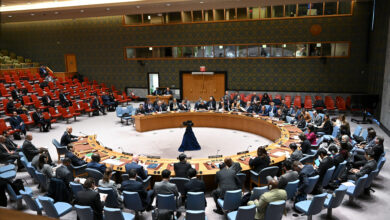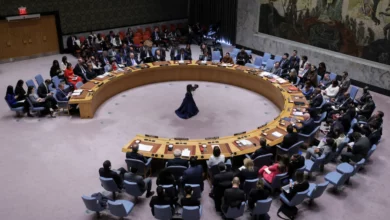
A rebel delegation flew out of the Yemeni capital on Tuesday heading for high-stakes talks in Sweden with the government aimed at ending the country’s devastating war.
The departure of the Huthi insurgents on a Kuwaiti plane followed a prisoner swap deal and the evacuation of 50 wounded rebels for treatment in Oman in a major boost to peace efforts.
The delegation was accompanied by UN envoy Martin Griffiths, an airport source said.
Rebel spokesman Mohammed Abdelsalam confirmed their departure on Twitter, saying the Huthis “will spare no effort to make a success of the talks to restore peace and end the aggression”.
At the same time he called on rebel fighters to remain “vigilant against any attempt at a military escalation on the ground”.
Although no date has been announced for the start of the talks, Yemeni government sources say they could get under way on Thursday.
The agreement to exchange hundreds of detainees was welcomed by the International Committee of the Red Cross, which will oversee the swap after the first round of planned peace talks in Sweden.
The deal was struck by Griffiths, who was in the rebel-held capital Sanaa for meetings already buoyed by the evacuation of the wounded insurgents — a key rebel precondition for the talks.
A previous UN-brokered attempt to bring the Huthis and the Saudi-backed government to the negotiating table collapsed in Switzerland in September.
The United Arab Emirates, another key backer of the beleaguered government, said the planned talks offered a “critical opportunity” to end nearly four years of war.
Yemeni government official Hadi Haig told AFP that between 1,500 and 2,000 members of pro-government forces and between 1,000 and 1,500 rebels would be released.
On the government side, they include former defense minister Mahmoud al-Subaihi, who has been held by the rebels ever since they overran the capital in late 2014, and President Abedrabbo Mansour Hadi’s brother Nasser, a general and former senior intelligence official.
Rebel official Abdel Kader al-Murtadha confirmed the deal, adding that he hoped it would be “implemented without problem”.
ICRC spokeswoman Mirella Hodeib welcomed the agreement, saying: “This is one step in the right direction towards the building of mutual trust among Yemeni communities.”
Worst crisis ‘deteriorating’
Thousands of prisoners have been captured by both sides in the grinding war of attrition that has devastated Yemen.
The resulting humanitarian crisis, already the world’s worst, will deteriorate in 2019, the UN said Tuesday, warning that the number of people needing food aid is set to jump by four million.
Overall, 24 million people in Yemen — roughly 75 percent of the population — will need humanitarian assistance in 2019, UN humanitarian chief Mark Lowcock told reporters in Geneva.
He said the dire figures underlined the importance of the planned peace talks in Sweden.
If the negotiations show results, “it is possible that we could find by the second half of the year that the extreme edge could get taken off the suffering of those people who have no form of income,” he said.
Kuwait’s Deputy Foreign Minister Khaled al-Jarallah earlier told reporters that his country’s ambassador to Yemen would also accompany the rebel delegation travelling to Stockholm.
The oil-rich Gulf emirate has been a mediator in the devastating conflict.
International support for the new peace bid has been spurred by UN warnings that 15 million Yemenis are at risk of famine as the humanitarian situation deteriorates.
A coalition-backed government offensive on the rebel-held Red Sea port of Hodeida has threatened to cut virtually the only gateway for UN-supervised aid.
Additional momentum has come from the mounting Western pressure on Saudi Arabia since the murder of dissident Saudi journalist Jamal Khashoggi inside the kingdom’s Istanbul consulate on October 2.
Deep divide
The coalition has largely suspended its offensive on Hodeida in the face of US-led calls for a ceasefire and new peace talks.
But fresh fighting flared on Monday and the coalition spokesman said military operations were “ongoing”.
The UAE’s state minister for foreign affairs, Anwar Gargash, said the peace talks must not lose sight of the demands made of the rebels by Resolution 2216 passed by the UN Security Council in April 2015, a month after Hadi fled into Saudi exile as they overran most of the country.
“A stable state, important for the region, cannot coexist with unlawful militias,” Gargash said.
“UN Security Council Resolution 2216 offers a workable roadmap.”
The resolution demands that the rebels recognize the legitimacy of Hadi’s government and withdraw from all towns and cities they had taken, including Sanaa.
The demands are unacceptable to the rebels and subsequent peace efforts, including three months of negotiations in Kuwait that broke down in 2016, have focused on a power-sharing government and a federal political system.




